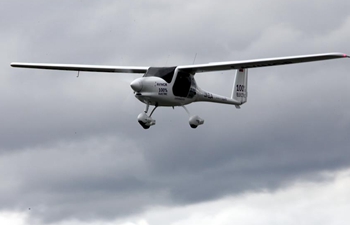WASHINGTON, June 20 (Xinhua) -- Chinese and American researchers found that T. Rex dinosaurs could not stick out their tongues, contrary to their classic image in the films where they bared their teeth with tongues wildly stretching from their mouths like giant, deranged lizards.
In a study published on Wednesday in the journal PLOS ONE, researchers suggested that many dinosaurs' tongues were probably rooted to the bottoms of their mouths in a manner akin to alligators, and they connected the origin of flight with an increase in tongue diversity and mobility.
The team led by Li Zhiheng, associate professor at the Key Laboratory of Vertebrate Evolution and Human Origins with the Chinese Academy of Sciences, compared the tongue bones of extinct dinosaurs and modern specimens, including three alligators and 13 bird species as diverse as ostriches and ducks.
Li carried out the comparison using the High-Resolution X-Ray Computed Tomography Facility at University of Texas at Austin.
The fossil specimens, most from northeastern China, included small bird-like dinosaurs, as well as pterosaurs and a Tyrannosaurus rex, one of the largest land carnivores.
The results indicated that hyoid bones of most dinosaurs were like those of alligators and crocodiles, short, simple and connected to a tongue that was not very mobile.
These findings revealed that dramatic reconstructions that showed dinosaurs with tongues stretching out from between their jaws were wrong, according to Julia Clarke, a professor of Geological Sciences at University of Texas at Austin and the paper's co-author.
The researchers also found that pterosaurs, which were bird-like dinosaurs, and living birds have a great diversity in hyoid bone shapes.
Tongue bones act as anchors for the tongue in most animals, but in birds these bones can extend to the tip.
The researchers suggested that the range of shapes could be related to flight ability or they evolved from an ancestor that could fly in the case of flightless birds such as ostriches and emus.
The researchers proposed that taking to the skies could have led to new ways of feeding that could be tied to diversity and mobility in tongues.
That evolution could be related to the loss of dexterity that accompanied the transformation of hands into wings, according to Li.
"If you can't use a hand to manipulate prey, the tongue may become much more important to manipulate food," Li said.
However, the fossil record haven't yet pinned down when these changes to the windpipe occurred. Also, the scientists noted one exception linking tongue diversity to flight as some plant-eating dinosaurs like triceratops had tongue bones that were highly complex and more mobile.
Further research on other anatomical changes that occurred with shifts in tongue function could help improve our knowledge of the evolution of birds, Clarke said.

















